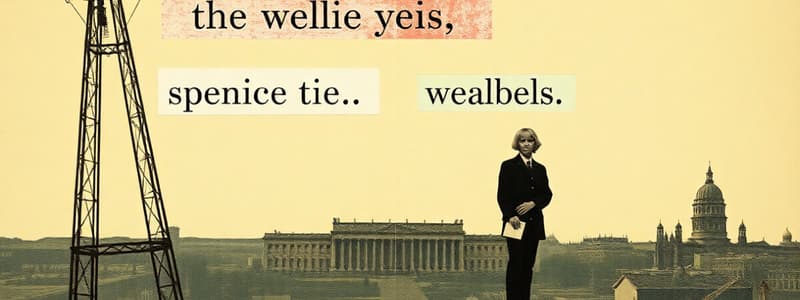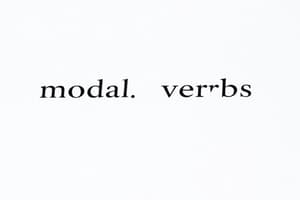Podcast
Questions and Answers
Which characteristic is NOT typical of modal verbs?
Which characteristic is NOT typical of modal verbs?
- They are followed by the base form of the verb.
- They do not change form based on the subject.
- They do not take '-s' in the third-person singular.
- They can be used in infinitive forms. (correct)
The modal verb 'must' typically expresses an external obligation or rule.
The modal verb 'must' typically expresses an external obligation or rule.
False (B)
What is the primary function of modal verbs?
What is the primary function of modal verbs?
Express possibility, necessity, permission, or ability
The modal verb '_____ not' expresses a prohibition.
The modal verb '_____ not' expresses a prohibition.
Match the modal verb with its primary function:
Match the modal verb with its primary function:
Which modal verb suggests a lower probability?
Which modal verb suggests a lower probability?
The modal verb 'shall' is commonly used for general future statements in modern English.
The modal verb 'shall' is commonly used for general future statements in modern English.
What is the base form of the verb that follows a modal verb?
What is the base form of the verb that follows a modal verb?
To express regret about a past action, one would use the modal perfect form '_____ have'.
To express regret about a past action, one would use the modal perfect form '_____ have'.
Match the modal perfect form with its function:
Match the modal perfect form with its function:
Which of the following quasi-modals expresses a past habit or state?
Which of the following quasi-modals expresses a past habit or state?
Quasi-modal verbs can change their form and have infinitives, unlike true modal verbs.
Quasi-modal verbs can change their form and have infinitives, unlike true modal verbs.
Give an example of a quasi-modal used to express future intention.
Give an example of a quasi-modal used to express future intention.
The quasi-modal 'be ______ to' expresses expectation.
The quasi-modal 'be ______ to' expresses expectation.
Match the quasi-modal with its function:
Match the quasi-modal with its function:
In the sentence, 'If I had known, I would have helped you,' what does 'would have' express?
In the sentence, 'If I had known, I would have helped you,' what does 'would have' express?
Using 'can' is a more formal way to ask for permission than using 'may'.
Using 'can' is a more formal way to ask for permission than using 'may'.
Which modal verb is used to express a strong belief that something is true?
Which modal verb is used to express a strong belief that something is true?
We ______ to respect our elders' is an example using which quasi-modal?
We ______ to respect our elders' is an example using which quasi-modal?
Match each modal verb with a sentence that correctly demonstrates its use:
Match each modal verb with a sentence that correctly demonstrates its use:
Flashcards
Modal Verbs
Modal Verbs
Auxiliary verbs expressing possibility, necessity, permission, or ability, adding nuances to the main verb.
Modal Verb Characteristics
Modal Verb Characteristics
Modal verbs don't change form based on the subject; they are followed by the base form of the verb.
Ability (can/could)
Ability (can/could)
Used to indicate someone's present (can) or past (could) capacity.
Possibility (may/might/could)
Possibility (may/might/could)
Signup and view all the flashcards
Permission (can/could/may)
Permission (can/could/may)
Signup and view all the flashcards
Obligation/Necessity (must/have to/should)
Obligation/Necessity (must/have to/should)
Signup and view all the flashcards
Prohibition (must not)
Prohibition (must not)
Signup and view all the flashcards
Advice (should/ought to)
Advice (should/ought to)
Signup and view all the flashcards
Deduction/Speculation
Deduction/Speculation
Signup and view all the flashcards
Future (will/shall)
Future (will/shall)
Signup and view all the flashcards
Habits/Tendencies (would)
Habits/Tendencies (would)
Signup and view all the flashcards
Requests (can/could/will/would)
Requests (can/could/will/would)
Signup and view all the flashcards
Offers/Suggestions (shall/can)
Offers/Suggestions (shall/can)
Signup and view all the flashcards
Modal Perfect Forms
Modal Perfect Forms
Signup and view all the flashcards
Meaning of Modal Perfect Forms
Meaning of Modal Perfect Forms
Signup and view all the flashcards
'Should have'
'Should have'
Signup and view all the flashcards
'Could have'
'Could have'
Signup and view all the flashcards
Quasi-Modals
Quasi-Modals
Signup and view all the flashcards
'Used to'
'Used to'
Signup and view all the flashcards
'Be going to'
'Be going to'
Signup and view all the flashcards
Study Notes
- Modal verbs are auxiliary verbs expressing possibility, necessity, permission, or ability
- They add nuances of meaning to the main verb
- Common modal verbs are can, could, may, might, must, shall, should, will, and would
Characteristics of Modal Verbs
- Modal verbs do not change form regardless of the subject
- The third-person singular form does not take "-s"
- Modal verbs are always followed by the base form of the verb (infinitive without "to")
- Modal verbs lack infinitives or past participles
Uses of Modal Verbs
- Ability: "can" and "could" indicate someone's ability to do something
- "Can" generally refers to present ability
- "Could" refers to past ability or a more polite request
- Possibility: "may," "might," and "could" express different degrees of possibility
- "May" indicates a higher probability or formal permission
- "Might" indicates a lower probability
- "Could" indicates a general possibility
- Permission: "can," "could," and "may" are used to ask for or give permission
- "May" is more formal
- "Can" is informal
- "Could" is a more polite way to ask for permission
- Obligation/Necessity: "must" and "have to" express obligation or necessity
- "Must" generally expresses the speaker's strong feeling of obligation
- "Have to" indicates an external obligation or rule
- "Should" and "ought to" express advice or recommendation
- Prohibition: "must not" (mustn't) expresses a prohibition
- It indicates that something is not allowed
- Advice: "should" and "ought to" are used to give advice or recommendations
- They suggest the best course of action
- Deduction/Speculation: Modal verbs can be used to make deductions or speculations based on available evidence
- "Must" expresses a strong belief that something is true
- "May," "might," and "could" express weaker possibilities
- Future: "will" and "shall" are used to talk about the future
- "Will" is more common for general future statements
- "Shall" is more formal and traditionally used with "I" and "we" for suggestions or offers
- Habits/Tendencies: "would" can be used to talk about past habits or typical behavior
- Requests: "can," "could," and "will" are used to make requests
- "Could" and "would" are more polite than "can" and "will"
- Offers/Suggestions: "shall" and "can" can be used to make offers or suggestions
- "Shall" is typically used with "I" or "we"
Examples
- Ability:
- She can speak Spanish fluently
- He could play the piano when he was younger
- Possibility:
- It may rain tomorrow
- It might snow later in the day
- The store could be closed on Sundays
- Permission:
- May I borrow your pen?
- Can I use your phone?
- Could I leave early today?
- Obligation:
- You must submit your assignment by Friday
- I have to go to the bank this afternoon
- You should eat more vegetables
- Prohibition:
- You must not smoke in this area
- Advice:
- You should study hard for the exam
- You ought to see a doctor about that cough
- Deduction:
- He must be tired after working all day
- She may be at the library
- Future:
- I will travel to Europe next year
- We shall overcome this challenge
- Habits:
- He would always arrive late to class
- Requests:
- Can you help me with this problem?
- Could you pass me the salt, please?
- Would you mind closing the window?
- Offers:
- Shall I help you with your luggage?
- Can I offer you something to drink?
Modal Perfect Forms
- Modal verbs can be combined with "have" + past participle to discuss past possibilities, obligations, or deductions
- Common patterns:
- "Should have" expresses regret or criticism about a past action
- "Could have" expresses a past possibility that did not happen
- "Would have" expresses a hypothetical situation in the past
- "Must have" expresses a strong deduction about a past event
- "May have" / "Might have" express uncertainty about a past event
Modal Perfect Form Examples
- Should have:
- I should have studied harder for the test (Regret)
- Could have:
- I could have gone to the party, but I was too tired (Missed possibility)
- Would have:
- If I had known, I would have helped you (Hypothetical past)
- Must have:
- He must have left already, because his car is gone (Strong deduction)
- May have:
- She may have forgotten about our appointment (Uncertainty)
- Might have:
- They might have taken a different route (Uncertainty)
Quasi-Modals (Semi-Modals)
- Quasi-modals, also known as semi-modals, are expressions that function similarly to modal verbs
- They convey shades of meaning related to possibility, necessity, and intention
- Unlike modal verbs, they can change form and have infinitives
- Common quasi-modals include:
- "Ought to" (similar to "should")
- "Have to" (expresses obligation)
- "Used to" (expresses a past habit or state)
- "Be able to" (expresses ability)
- "Be going to" (expresses future intention)
- "Be supposed to" (expresses expectation)
- "Need to" (expresses necessity)
- "Dare to" (expresses courage or willingness)
Quasi-Modal Examples
- Ought to:
- We ought to respect our elders
- Have to:
- I have to finish this report by tomorrow
- Used to:
- I used to play the guitar
- Be able to:
- I am able to solve complex problems
- Be going to:
- I am going to visit my family next week
- Be supposed to:
- You are supposed to be here by 9 AM
- Need to:
- I need to buy groceries
- Dare to:
- She didn't dare to speak up
Studying That Suits You
Use AI to generate personalized quizzes and flashcards to suit your learning preferences.




